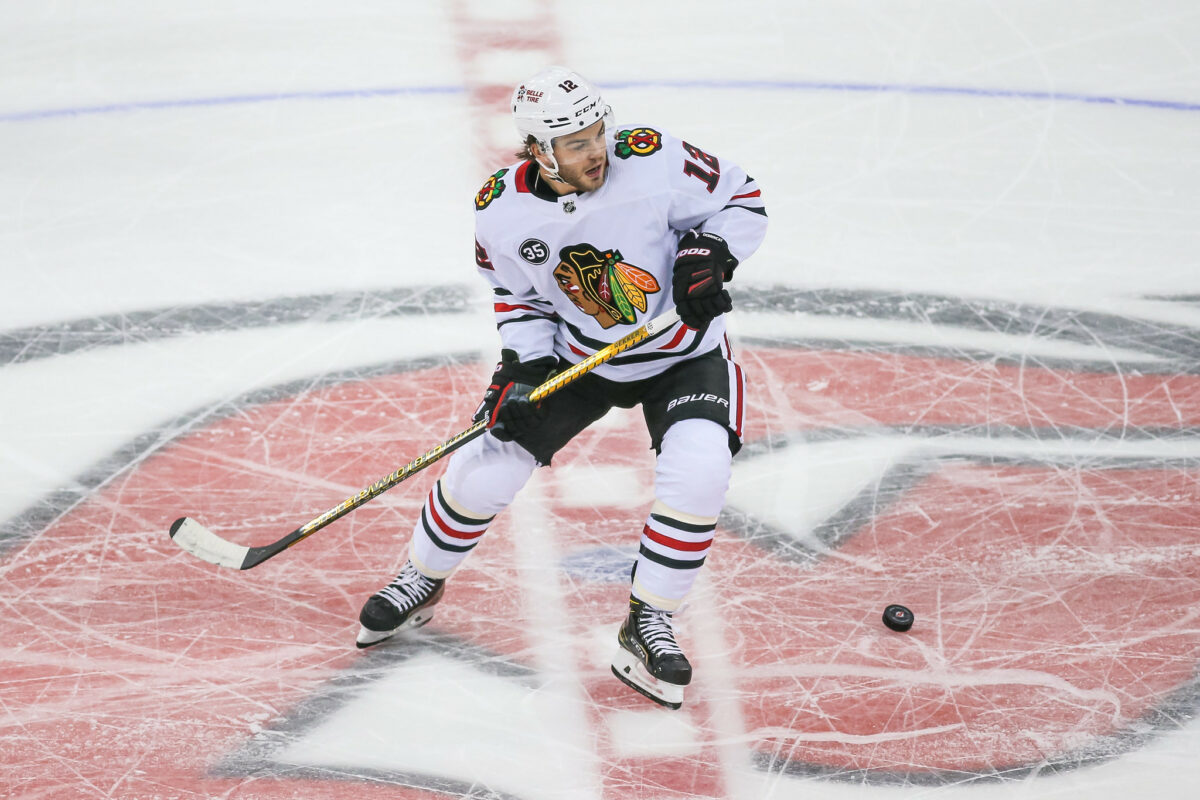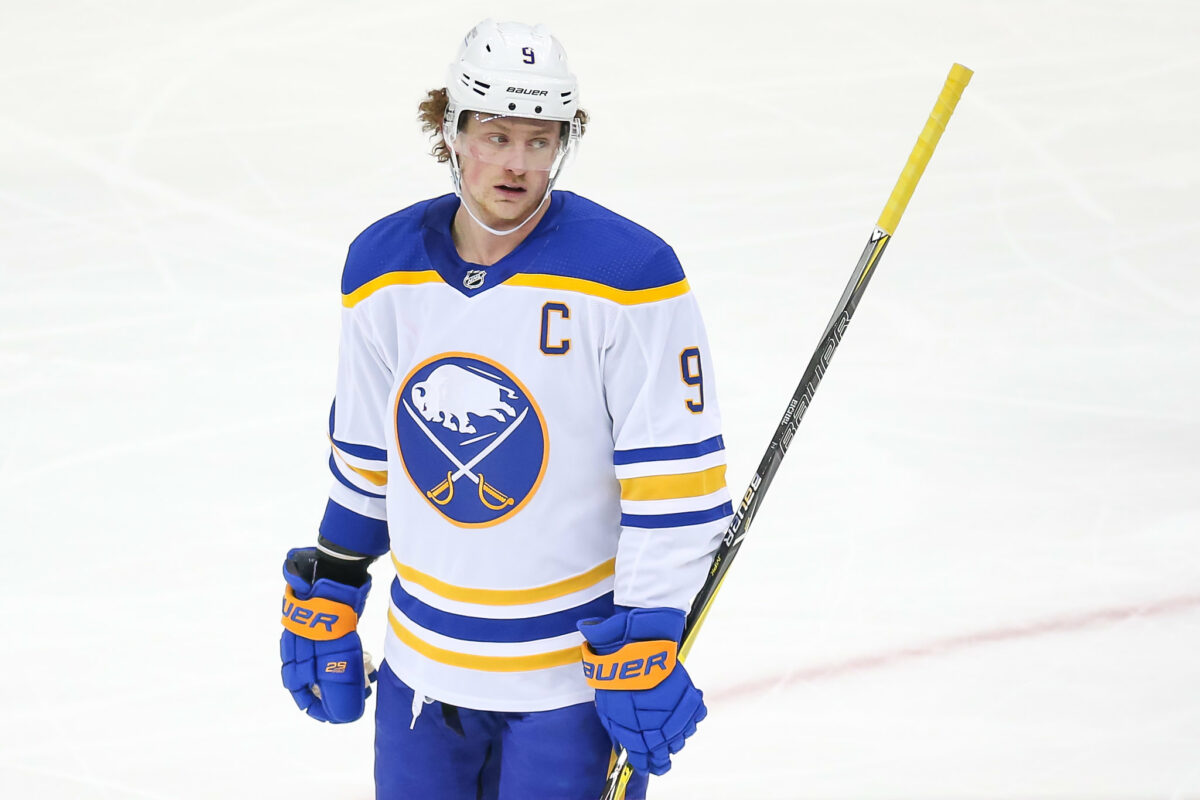Rebuilding a franchise is not a simple task, especially when it is accomplished by tearing everything down to the bottom and starting from scratch. The Buffalo Sabres did this back in the 2013-14 season when they traded away star players like Ryan Miller, Thomas Vanek, and Jason Pominville, and the Chicago Blackhawks are following this same formula for their current teardown. At the 2022 NHL Draft, they traded away Alex DeBrincat to the Ottawa Senators and Kirby Dach to the Montreal Canadiens. Both players are yet to turn 25 years old, and the moves stunned the hockey world when commissioner Gary Bettman made the announcements.
While the 2013-14 Sabres did not have the youth that the Blackhawks have, they did have a solid and reliable core group. Once management realized that they were not going to push for playoff contention anymore, Miller, Vanek, and many others were shipped out for draft picks and replaced with mediocre roster players to ensure that the team would not be competitive. The ultimate goal was to tank, as in 2014 it was to get either Sam Reinhart or Aaron Ekblad, and in 2015 it was to snag Connor McDavid. The Sabres got Reinhart in 2014 and settled for Jack Eichel in 2015, and in 2022 neither of those players currently plays in Buffalo. At the time, Sabres fans were on board with the idea of tanking as there was a promise of success in only a few years afterwards. Unfortunately, it was a promise that never came to fruition.
Trading Young Players For Picks Is a Waste of Time
Based on the moves made this offseason, the Blackhawks’ goal is clearly to dump as much NHL talent as possible for future assets. The prize of the 2023 NHL Draft is Connor Bedard, a potential franchise-caliber center with comparisons made to McDavid, and the Blackhawks clearly have their sights set on drafting him. The problem is not that they are trading NHL roster talent for draft capital and prospects, it is that they are tearing it down to the bottom and sacrificing high-end young players that haven’t even grown into their prime yet.

DeBrincat is a speedy goal scorer with immense upside to still grow further. He has shown his ability to create plays and finish them, but spending time away from Patrick Kane will be tough for his development. He was easily their best player besides Kane, and while moving him ensures that the roster will be less competitive, it takes away from the future firepower of the team. Dach is a very big and creative young center that has the ability to read plays and make passes that otherwise look improbable. Trading these two players away is foolish and is a massive new mistake stacked on top of other similar repeated ones made by the Sabres. On top the fact that the Blackhawks did not retain the rights of or re-signed Dominik Kubalik, the list grows even larger.
While the Sabres did not trade many young assets away right at the start, they did move some key assets in order to acquire NHL talent once their future core was secured in Reinhart, Eichel, and Ristolainen. Acquiring players such as Evander Kane, Robin Lehner, and Ryan O’Reilly ended up doing nothing significant, and former general manager Tim Murray moved many future assets to acquire these players. This crippled the Sabres’ prospect pool and set them back a number of years as they relied too heavily on Eichel.
The problem here is the way that the Blackhawks are starting their rebuild; by holding on to older players and trading the young talent away. If they kept the young forwards and traded players like Kane or Johnathan Toews for high-end picks, it would have made much more sense. It is still likely that the Blackhawks move on from Kane and Toews, but seeing them moved after the likes of DeBrincat and Dach makes little to no sense.
Sabres’ Playoff Drought Should Make the Blackhawks Weary
Rebuilding with the right foundation is the key to any successful teardown. The Oilers are reaping the rewards of their patience and making some great moves along the way, but the Sabres had not found the right formula for success until this past season. Year after year was another form of failure by another facet of the organization. Some years it was the players not producing up to necessity, other years it was management making foolish roster decisions, and most recently before the Kevyn Adams/Don Granato era, the coaching was the biggest failure they had.

The Blackhawks need to understand the root of each failure that tripped up the Sabres along the way to their record-setting playoff drought. Making key decisions at the right time will mean all the difference between another year at the bottom and making progress into becoming a respectable organization again. The Sabres have had their name run through the mud for years and have been the laughing stock of the league for their repeated feeble attempts to compete for anything meaningful. This past year was a massive step forward for them due to the new process in place as Adams and Granato retooled after the Eichel trade and have built a new culture to go along with their “development first” approach to building the franchise. The Blackhawks took a good step by picking a number of highly touted young players, but what they do next with them will be the key moving forward.
Avoiding The Sabres’ Legacy of Failure
Signing free agent players to big contracts can always come back to bite a franchise, especially when they decide to give up on playoff contention. The Blackhawks locked themselves into a $9.5 million cap hit for eight years when they re-signed Seth Jones, and his no-movement clause gives him a lot of control over where he can be traded in the future. This limits the return they can get for him, and it is reminiscent of when the Sabres gave Kyle Okposo a seven-year deal carrying a $6 million cap hit, or when they re-signed Jeff Skinner to an eight-year pact that carries a $9 million cap hit with it. While the Okposo deal is currently coming to an end and Skinner has resurged into his former self, the Sabres have had too many contracts in recent years that are now impossible to move. If the Blackhawks are able to trade Jones, it will not be for as good a haul as they got for DeBrincat or even Brandon Hagel at the trade deadline.
Related – Sabres’ Decade of Disappointment
Navigating the balance of paying young players before they reach their potential, and locking them up long term, while also leaving enough room for veterans to be brought in at the right time will be paramount for the Blackhawks’ turnaround. Should they continue down the path they have set themselves on, they will continue to make the same mistakes the Sabres have. Being caught up in tanking for that “one key player” is not the only way to build a team. Buffalo paid the price by investing all their time and effort into Eichel, and it blew up in their face. It takes a group effort and chemistry between all of the young players to make a winning team. Blackhawks fans know what it is like to have a dynasty, so the pressure is on for management to do this rebuild right, or risk ending up like the Sabres have been for a decade.